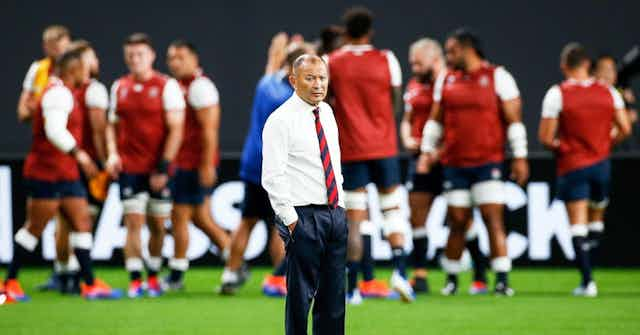After six weeks of exciting clashes between the best rugby players on the planet, the 2019 World Cup in Japan has come down to one final game on Saturday November 2 between England and South Africa. England go into the match as clear favourites against South Africa. What does this mean for both teams?
Before England’s semi-final defeat of New Zealand on October 26, the team’s head coach Eddie Jones focused on being the underdog, given the All Blacks’ recent dominance of world rugby. But he can’t do that this week.
Jones had a consistent message in the lead up to the semi-final:
No one thinks we can win. There’s no pressure on us, we’ve just got to have a great week, enjoy it, relax.
In one press conference, Jones even challenged journalists in the room to “Put up your hand if you think we can win”. No one did, and Jones took this response as confirmation that there were no expectations on England to be successful. The team had no pressure, they had nothing to lose.
Underdog spirit
It’s not surprising Jones took advantage of the “underdog” tag in the lead-up to the semi-final. New Zealand had won the two previous world cups in 2011 and 2015 and have been heralded by many as the greatest sporting team ever. In the mind games before the match, Jones had to find whatever edge he could get.
Being an underdog can be a motivating factor. The thought of exceeding expectations against a superior opponent and proving others wrong will often spurs players on. Meanwhile, the favourites are seen to be under more pressure because of expectations to win.
While saying England were under no pressure, mischievously, Jones took the chance to turn it round on New Zealand, at one point saying: “They’re looking for their third world cup, that does bring pressure.”
Highlighting the underdog status supported the findings of our study which examined leader communication in the 1997 Lions tour of the then world champions South Africa. We found that “embracing and reinforcing the underdog status” had been a key aspect in inspiring players.
For example, in the famous “Everest speech” by assistant Lions’ coach Jim Telfer from the 1997 tour, he said people: “Don’t rate us, don’t respect us”. It was before the first match of what was to be a hard series. South Africa were well known for their powerful forward pack, and were strong favourites to beat the Lions.
But people are inspired by these ideas of proving people wrong, and achieving in such situations. The Lions, against the odds, went on to win the first test match and ultimately the series, two matches to one.
Change of strategy
With England now favourites against South Africa’s Springboks, the coach has changed his underlying message. In his press conferences since the semi-final, Jones has listened to the questions about being favourites and has performed a little side-step, choosing to talk about “being excited to be here, and the challenge that lies ahead”. He also focused on how the side were ready for the challenge ahead, saying: “There’s a nice relaxed feeling because they know they’ve done the work … we’ve had such good preparation, we can go out and play without fear.”
The previous week, while claiming there was no pressure against the All BLacks, Jones’ message had been subtly different: “We’re going to have a great week, relax, train hard, enjoy this great opportunity.”
Ahead of the final, while the headline message is different, the underlying philosophy is the same: to take the pressure off the team, and to allow them be relaxed and play to their full potential. Maybe times are changing in the way coaches speak to their players ahead of big matches. If so, Jones’ calm approach certainly marks this change.
How to inspire players
The Hollywood-style depictions of inspirational speeches – possibly exemplified by Al Pacino in his “Inches” speech in the 1999 American Football film Any Given Sunday (“We can climb out of hell one inch at a time”) or the passionate speeches we saw delivered on the 1997 Lions tour – may be a thing of the past.
It seems as if this deeply emotional appeal to players has been replaced by clear, calm approaches from the coach. When our team researched inspiration in sport in 2016 what we found supports the benefits of such an approach. We found that to inspire players, coaches should show them the way forward and provide clear messages on how they can be successful. They must demonstrate a calm belief in their players to achieve such success.
Jones is likely to be focusing on these key messages, such as working with the England team on strategies to overcome South Africa and reinforcing the players’ belief they have the skills and abilities to put those strategies into practice and emerge victorious.
A more recent research project that I was involved in, which also examined inspirational coach leadership and was published in June 2019, suggested that the players’ trust in their coach is at the heart of the process. Whatever Jones’ message, it appears the England team have full trust in their coach and the systems put in place to be successful. This may be key to why Jones is proving to have such an inspirational impact on the English side.
All England fans will be hoping that England approach the final with the right attitude and without feeling the pressure that might restrict the way they play and the intensity of their performance. They will be hoping that their team come out on Saturday, play with skill, flair and without fear – and justify their favourites tag.

